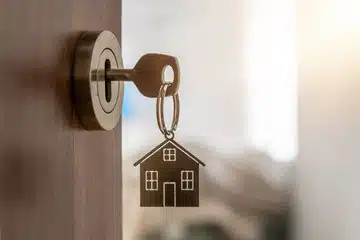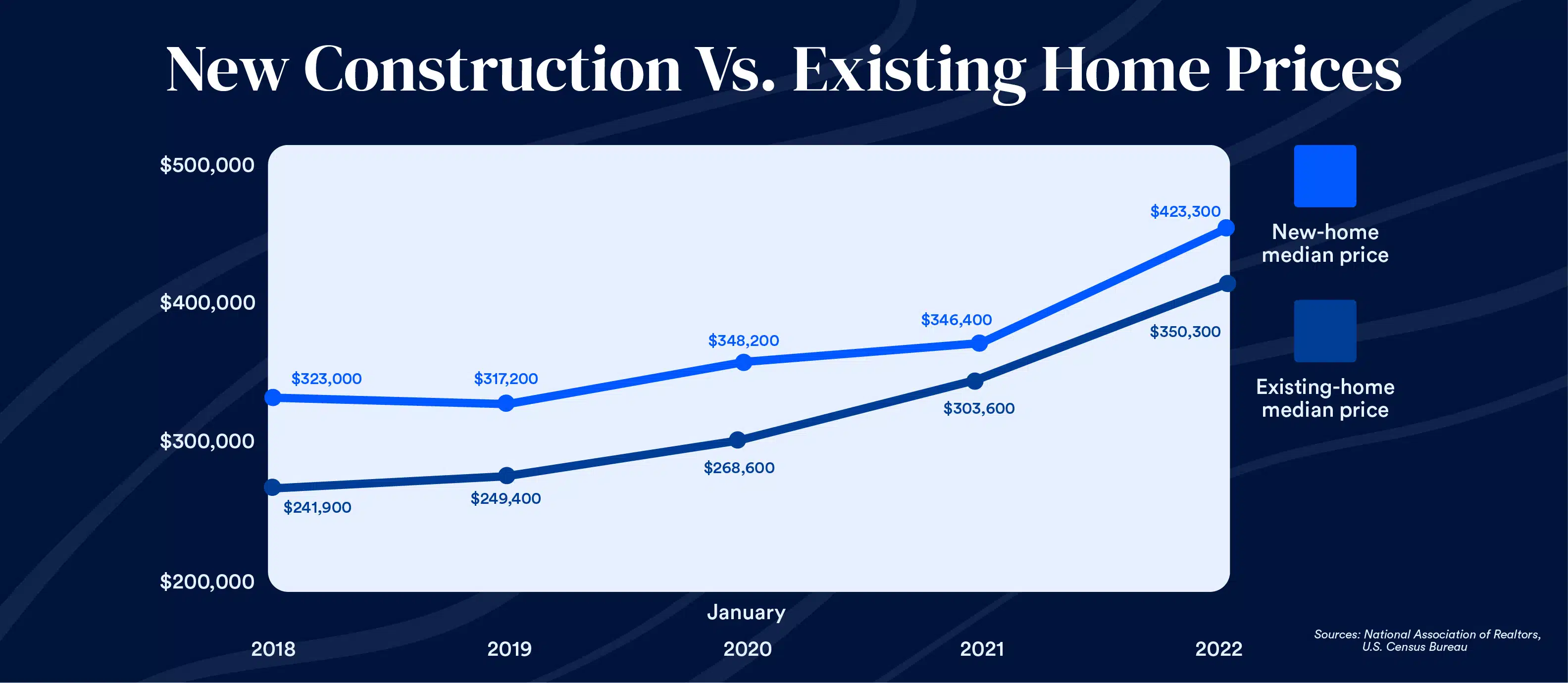Building a new home vs. buying an existing one: it’s a question you might be asking if you’re in the market to buy a home. More than a third of homes on the market are currently new construction — the highest percentage ever, according to Redfin — but the share of actual sales leans more heavily in favor of existing homes, at 89%.
The truth is that there are pros and cons to each option, and the right choice really depends on what a buyer is looking for in their new home. In this article, we’ll explore 6 questions you can ask yourself to help determine which one is better for you and your family.
Quick Takeaways
- New home communities may still be developing, while most existing homes are located in established neighborhoods.
- New construction homes come with more community amenities (like pools or parks) and have more options for customization.
- Existing homes are located everywhere — buying one provides greater location flexibility than buying new construction.
- Availability of new construction homes varies by region. In the United States, the south has more new construction homes than northern states.
- On average, new home prices are slightly more expensive than existing homes.
Building a New Home vs. Buying an Existing One: 6 Questions to Consider
What kind of neighborhood do you want to live in?
There are several differences you’ll find in new construction communities vs. neighborhoods full of existing homes. For starters, like the homes themselves, new construction communities are just being developed. They have a less-established culture and may be lacking in traditions such as community events and engagement. They might even still be under construction in some places, impacting the visual appeal (at least for the near future) and bringing unwelcome noise along with it.
That said, new construction communities also typically come with benefits like HOA upkeep, shared amenities (think pools, clubhouses, green spaces, athletic courts, playgrounds, and more). As one of the first members of a new community, you’ll also have the opportunity to play a role in building the culture there.
Established neighborhoods, on the other hand, are richer in tradition and usually come with already-active communities. You’ll find favorite local businesses, fully-occupied residential streets, and other infrastructure (like community watch or other civic groups) already formed.
On the downside, any outside amenities won’t be shared exclusively with the people living in your community. While this might not be a dealbreaker, it can have certain downsides such as crowds or unclean conditions.
Do you want the ability to customize?
If you know you want high levels of customizability, a new construction home might be the best choice for you. When you purchase new construction, you can often customize everything from the floor plan to paint colors, fixtures, and hardware throughout the house.
Existing homes, on the other hand, are sold as-is. That’s not to say you’ll have no opportunities to customize — you can renovate and make changes once you move in — but it’s less convenient (and can be more expensive) than customizing a new home as it’s being built.
Are you willing to take on a fixer-upper or do home renovations?
Even if a custom home isn’t at the top of your priority list, you may end up doing your fair share of renovations and/or repairs when you buy an existing home. Home inspection prior to purchase will check for any immediate and game-changing problems, but in a home that’s older you’ll inevitably deal with needed repairs periodically, and you may want to renovate outdated features.
In a new construction home, everything you get is brand new. You can expect much lower maintenance costs for the first several years you live there, and home warranties often cover defective items or unexpected issues that arise earlier than they should.
Are you looking for a home history and character?
For many buyers, history and character in a home is important. This is one thing you can often find in spades in older existing homes, but less so in new construction homes.
Building materials and trends have changed, and intricate details in woodwork and stone often found in very old homes is much less common in new ones (and especially brand new construction). Many of the home features we define as having “character” are thought to be so for the very fact that they’re old.
On the flip side, new construction homes allow you to build character features on your own over time.
What is your budget for buying your home?
Home price varies enormously by location (among many other factors). In general, however, new construction homes are more expensive than existing ones. As reported by Bankrate earlier this year, home price trajectories are alike across the two, but the price point for new construction homes consistently remains a bit higher.
In addition, many of the customized finishes buyers want in new construction homes come at a premium price. As a rule of thumb, you can expect to need a bigger budget if your plan is to build a new home.
What’s available in your desired geographic area?
Availability of both new construction homes and existing homes in a buyer’s desired location can impact their decision about which one to purchase. New homes are typically built outside of cities, in areas where there is plenty of land to develop.
Actual inventory varies by region, as well — southern states, on average, have a higher volume of new construction homes for sale than their northern neighbors.
Existing homes, of course, exist in every kind of place from urban city centers to sprawling rural areas. You’ll have more location flexibility when you look to buy an existing home.
Putting it All Together
As you make a final decision, consider your new construction vs. existing home checklist:
- Do you want (A) a newly developed neighborhood with amenities or (B) an established neighborhood with traditions?
- Are you looking for (A) the ability to customize a brand new home or (B) a home with features that show history and character?
- Would you rather (A) pay a higher price up front for a brand new home or (B) buy at a lower price with higher potential for needed repairs?
- Do you (A) feel willing to move where the right home is available or (B) have a very specific location in mind?
If you answered mostly A, building a new home is probably the right choice for you! If you chose mostly Bs, an existing home might be the better option.
Moving to Dayton?
No matter what kind of home you’re looking for, Oberer Homes can help you find (or build!) one that’s right for you. Contact us today to learn more and start your search.
Share this Post

